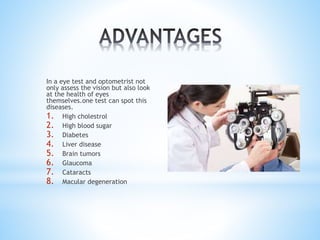Eyecare Near Me: Comprehensive and Reliable Vision Solutions
Eyecare Near Me: Comprehensive and Reliable Vision Solutions
Blog Article
Recognizing the Different Eye Conditions Treated by Specialized Eye Treatment Professionals
In the realm of eye treatment, specialized experts play a critical function in detecting and treating a broad range of eye conditions. As we embark on this expedition of the numerous eye problems resolved by specialized eye care experts, it ends up being obvious that the complex internet of ocular health holds a myriad of remarkable understandings waiting to be revealed.
Common Refractive Errors
Refractive errors are common visual problems caused by a flaw in the eye's capacity to properly concentrate light, resulting in blurred vision. Astigmatism is identified by an irregularly shaped cornea, resulting in altered or blurred vision at all distances. Presbyopia is an age-related problem where the lens loses its adaptability, making it difficult to concentrate on close items.
These refractive errors can be fixed with different methods, including eyeglasses, call lenses, or refractive surgical procedure. Eye care specialists play an important duty in identifying and managing refractive mistakes to assist people achieve more clear vision and boost their top quality of life.
Age-Related Eye Conditions
One of the most prevalent age-related eye conditions is age-related macular deterioration (AMD), a disease that causes central vision loss and can make activities like analysis and driving challenging. Cataracts, one more usual problem amongst older individuals, trigger clouding of the eye's all-natural lens, leading to obscured vision. Routine eye examinations with specialized eye care specialists are essential for early detection and management of these age-related eye conditions to protect vision and preserve ocular health as people expand older.
Vision-Threatening Conditions
Vision-threatening diseases include a variety of major ocular conditions that have the potential to substantially influence an individual's sight and overall visual feature. These illness present a risk of irreversible vision loss if not without delay diagnosed and treated by specialized eye care professionals. Some typical vision-threatening illness include glaucoma, diabetic person retinopathy, age-related macular degeneration (AMD), and retinal detachment.
Glaucoma is a team of eye conditions that harm the optic nerve, usually due to high intraocular stress, leading to peripheral vision loss and prospective loss of sight if left unattended. AMD is a modern condition affecting the macula, leading to main vision loss.
Very early detection, normal eye tests, and prompt intervention are crucial in taking care of vision-threatening illness to protect eyesight and maintain quality of life. Specialized eye care experts play a crucial duty in diagnosing, treating, and managing these problems to prevent irreversible you can look here vision loss.

Corneal Conditions
Corneal conditions include a range of problems that affect the clear front component of the eye, called the cornea. These problems can bring about pain, visual disturbances, and in severe situations, vision loss. One typical corneal condition is keratoconus, where the cornea thins and bulges outside right into a cone form, triggering astigmatism and blurred vision. Corneal dystrophies, such as Fuchs' dystrophy, cause steady vision loss due to uncommon down payments in the cornea. Corneal abrasions, often brought on by injury or foreign things, can bring about discomfort, inflammation, and level of sensitivity to light. In addition, infections like keratitis can inflame the cornea, potentially leading to scarring and vision impairment if not immediately treated. Treatment for corneal disorders varies depending upon the certain condition yet may include medicines, contact lenses, or in severe situations, corneal transplants. Routine eye exams are vital for early detection and administration of corneal disorders to preserve vision and eye wellness.
Neurological Eye Conditions
Neurological eye conditions involve problems that influence the connection between the eyes and the mind, influencing visual handling and overall eye function. These problems more information can materialize in different means, impacting vision, eye motions, and also the sychronisation in between the eyes. One typical neurological eye problem is optic neuritis, identified by inflammation of the optic nerve bring about vision loss, shade desaturation, and discomfort with eye activity.
Another significant problem is nystagmus, where the eyes make repeated, uncontrolled activities, influencing aesthetic acuity and deepness assumption. Furthermore, problems like amblyopia, often referred to as "careless eye," result from abnormal visual advancement in early childhood, resulting in lowered vision in one eye.
Neurological eye problems call for specialized treatment from specialists like neuro-ophthalmologists who have experience in both neurology and ophthalmology. Medical diagnosis often entails a detailed eye assessment, imaging research studies, and collaboration with neurologists to attend to the underlying neurological problems influencing the aesthetic system. Therapy approaches can include medicine, vision therapy, or in extreme situations, surgical interventions to manage these complex conditions efficiently.
Final Thought
In final thought, specialized eye treatment experts treat a large variety of eye problems, including common refractive errors, age-related eye conditions, vision-threatening illness, corneal conditions, and neurological eye conditions - refractive surgeries view it in al. By understanding these various problems and seeking suitable therapy from eye care experts, individuals can maintain optimum eye health and wellness and vision. It is necessary to focus on regular eye evaluations and comply with advised therapy strategies to preserve and secure one's vision for the future
Report this page